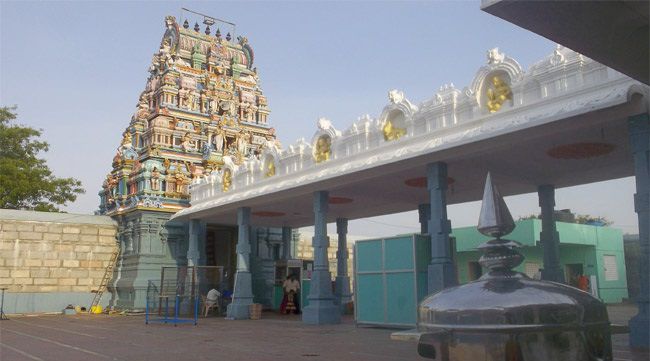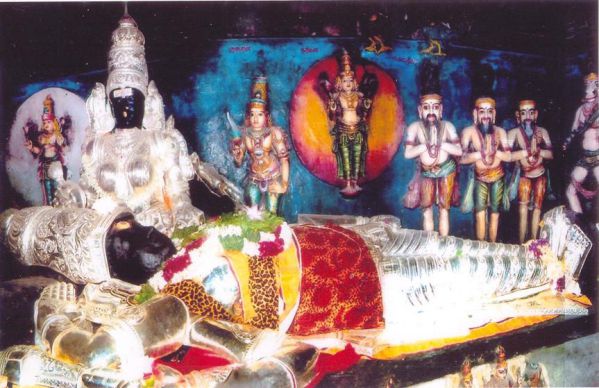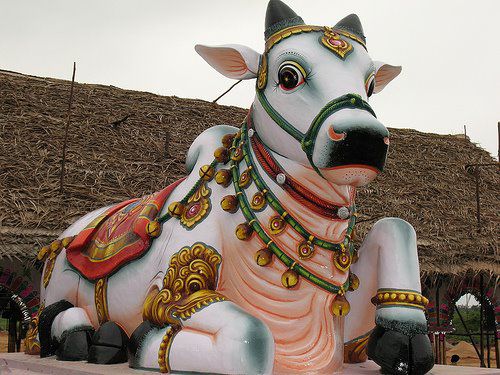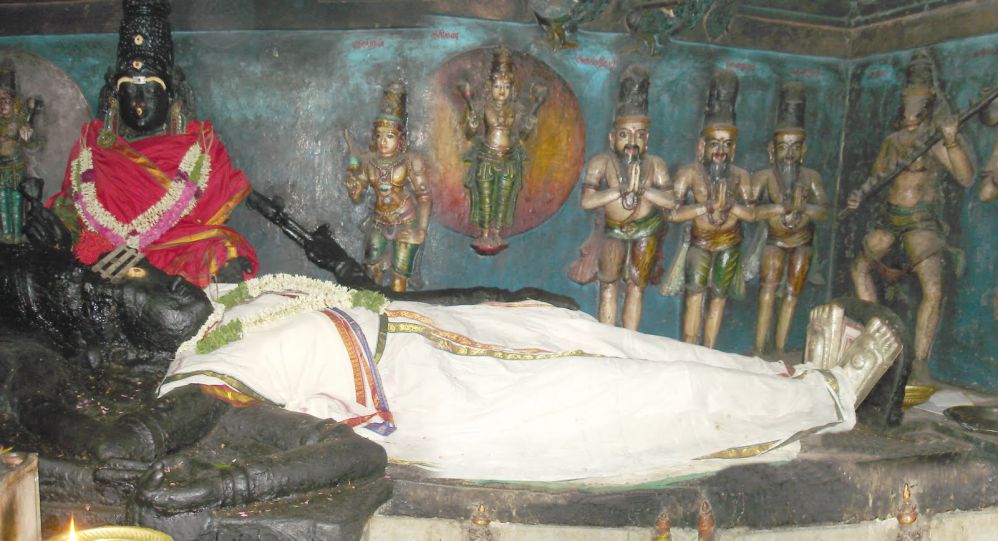No products in the cart.
Shiva meaning “The Auspicious One”, also known as Mahadeva (“Great God”), is one of the three major deities of Hinduism. Shiva is in the form of Vishnu and Brahma yet one with them. He is Anant, one who is neither found born nor found dead. He is the Parabrahma within Shaivism, one of the three most influential denominations in contemporary Hinduism. He is one of the five primary forms of God in the Smarta Tradition, and “the Transformer”.
At the highest level, Shiva is regarded as limitless, transcendent, unchanging and formless. Shiva also has many benevolent and fearsome forms. In benevolent aspects, he is depicted as an omniscient Yogi who lives an ascetic life on Mount Kailash, as well as a householder with wife Parvati and his two children, Ganesha and Kartikeya, and in fierce aspects, he is often depicted slaying demons. Shiva is also regarded as the patron god of yoga and arts.
Apart from anthropomorphic images of Shiva, the worship of Shiva in the form of a lingam, is also important. These are depicted in various forms. One common form is the shape of a vertical rounded column. Shiva means auspiciousness, and lingam means a sign or a symbol, so the Shivalinga is regarded as a “symbol of the great God of the universe who is all-auspiciousness”. Shiva also means “one in whom the whole creation sleeps after dissolution”. Since, according to Hinduism, it is the same god that creates, sustains and withdraws the universe, the Shivalinga represents symbolically God Himself.
In all the temples we can see Lord Siva in form of Sivalingam. But in this temple we can see Lord Siva in sleeping posture on the lap of Sarva Mangala Devi (Parvati Devi). Palli Kondeswarar Temple is a Hindu temple dedicated to Lord Siva located in Surutapalli, a village in Chittoor district of Andhra Pradesh state close to the border of Tamil Nadu, India. Surutapalli is located 55 km away from Chennai on the Chennai Tirupati highway near Uthukottai.

According to Sthala purana (history of the place), it is said that Asuras (demons) and Devas (Gods) decided to consume the nectar from Kseerabthi (the milk ocean) to live immortal. Hence, they churned the ocean with the help of Vaasuki (the celestial snake) and the hill Mandhara, with Gods on one side and demons on the other. Unable to tolerate the pressure, Vaasuki spilled out the poison from his mouth. The Gods and demons then approached Lord Shiva to save them from the harmful effects of poison as it would have killed the leaving creatures on the earth and also Gods and demons. Lord Shiva transformed himself into Vishabhakarana Murthy and swallowed the poison. He then started feeling little giddy. As he laid down, his consort. Goddess Parvati placed Lord’s head on her lap and gently pressed His neck and thus the poison remained in His throat without affecting His body. Hence Lord Shiva got the name as Neelakantha – `Neela’- blue with poison and ‘Kantha’- throat and As Goddess Parvati held the poison in the throat she is called as Sarvamangalabigar. It is in this place the Lord rested on the lap of Goddess Paravati. During this time all the gods, maharishis and rishis assembled here for the well-being of Lord Shiva and this place got its name as Surutapalli. Surutta means assembly of Gods.
The Devas and Asuras resumed their effort to get the nectar from the ocean on Lord Shiva’s orders, after he regained consciousness and obtained the nectar on Dwadasi (12th moon day). In that happiness, they forgot to thank Lord Siva who consumed the poison for everyone’s well-being. Realizing their mistake, they prayed Him for forgiveness on Trayodashi (13th moon day) for which the Lord forgave them and in a happy mood, began His celestial dance, Shiva Tandavam, between the horns of Nandi, the mount of Lord Shiva, where all the Gods, Goddess and sages joined Him. This moment is celebrated as Pradosham every fortnight and hence Pradosha Pooja is said to have originated from this temple. It is believed that during Pradosha Punya Kaalam, anyone who offers prayers will attain shanti (peace), sakala sowbhagyam (Complete Happiness) and will be comforted from the obstacles of life. Even Lava and Kusha, who unknowingly fought with their father Lord Rama, over Ashwamedha Yagna, came to this temple along with Sage Valmiki. To worship Lord Siva and to get rid of their sins. Another prominence of Surutapalli is that most of the deities are present with their consorts in their respective temples.

This temple has huge devotees coming on the 13th day of every fortnight (Pradosham) to offer prayers to the Lord.
Pradosha or Pradosham is a bimonthly occasion on the thirteenth day of every fortnight in Hindu calendar. It is closely connected with the worship of Hindu god Shiva. The auspicious 3 hour period, 1.5 hours before and after the sunset is one of the optimum time for worship of Lord Shiva. The fast or vow performed during the period is called “Pradosha vrata”. A devotee should wear Rudrakash, Vibhuti and worship Lord Shiva by Abhishek, Sandal paste, Bilva leaves, Fragrance, Deepa & Naivaedyaas (Food offerings)
Pradosha is indicative of day names in the calendar. Etymology of Pradosha – Pradosha is the son of Kalpa and Dosha. He had two brothers namely Nishita and Vyustha. The three names mean beginning, middle and end of night. The days from new moon day to full moon day is called “Sukla Paksha” and days from every full moon day to new moon day is called “Krishna Paksha”. During every month and during every Paksha, the point of time when Trayodashi (13th day of the fortnight) meets the end of Dwadasi (12th day of fortnight) is called Pradosha. During Pradosha, Nandi (the sacred bull of Shiva) in all the Shiva temples in South India is worshipped. The festival idol of Shiva with Parvati in a seated pose on Nandi is taken as a procession in the temple complex.

The Devtas, celestial deities approached Shiva in the most propitious moments of Pradosha to get relief from asuras – Danavas and Daityas. They ran around Kailash, Siva’s abode hitherto on a Trayodashi evening and was aided by Nandi, Shiva’s sacred bull. Shiva aided them in killing the asuras – the practice of worshiping Shiva on Trayodashi along with Nandi emerged and continues in Shiva temples. “Pradosha vrata” (vow) is performed on Pradosham with sacred ritual steps following the tradition.
Pradosham when performed with the right rituals (Abhishek) can fulfill every wish of the devotees. Shiva Abhishek is usually performed to a Lingam representing his manifestation as a creator of good (by destroying evil). In many temples, one finds a vessel hung over the Lingam that continuously drips water or other offerings onto the Lingam in deference to Shiva’s desire for Abhishek.
Some of the common items used for Shiva Abhishek are:
- Curd
- Milk
- Honey
- Tender Coconut Water
- Vibhuti (holy ash)
- Panchamrita (Curd based delicacy consisting of Panch (5) items: Milk, Sugar, Ghee (clarified butter), Honey, Bananas)
- Bananas
- Sandalwood Paste
- Ghee (Clarified butter)
Since Shiva is said to wear Nageshwara (Snake God) as an ornament around his neck, it is said that the fragrance of Aloe (which attracts snakes) is also a very holy item to be used for the worship of Shiva.
In contrast, it said that Lord Vishnu is Alankara Priyar (Desirous of ornamentation). Hence Vishnu Sthalas (places of worship of Lord Vishnu) have elaborately carved idols of Lord Vishnu with the Alankara (decoration ceremony) post the Abhishek, being a very elaborate ritual.
In any discussion of Hinduism, it is important to remember that these rituals are an off shoot of the interpretation of Vedas, the holy text of Hindus. These texts by themselves do not outline the deities or rituals for their worship thereof.
Abhisheka and Its Effects:
PANCHAGAVYAM – Removes all sings of mankind
PANCHAMRUTHAM – Gives wealth
GHEE – Gives Moksha state
MILK – Gives long life
CURD – Gives Good Children
HONEY – Melodious voice
RICE POWDER – Frees from debts
SUGAR CANE JUICE – Gives good health and removes enmity
LIME JUICE – Removes fear of death
TENDER COCONUT JUICE – Gives enjoyment and full satisfaction in life
COOCKED RICE (ANNAM) – Gives Majestic life
SANDAL PASTE – Gives Lakshmi’s Grace
SUGAR – Removes Enmity.






